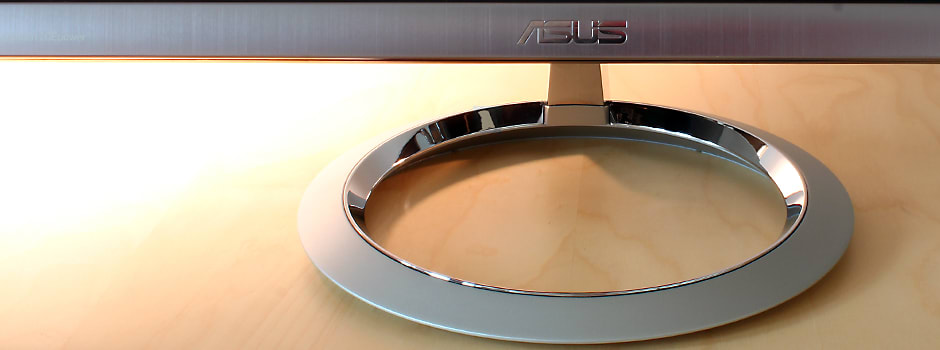These 23- and 27-inch monitors are beautifully designed, both inside and out: Their current-generation AH-IPS panels are wrapped in minimalist chrome and perch upon smooth, circular stands.
After testing, it's clear that the MX279H is not a powerhouse performer in terms of color accuracy, and some of its features simply don't work as advertised.
For $329, though, this 27-inch display is still a very attractive product, boasting solid audio and a pleasing image. It's also a rare, design-focused breed within a sea of repetitive, plastic peers.
Hardware & Accessories
For those who value beauty
With a byline like "Designo," you can venture a guess about one of this monitor's most appealing attributes. The MX279H is indeed quite attractive. The base is a chrome circle that holds the panel aloft along a thin chrome strip. Asus calls the MX279H "Frameless," and we're inclined to agree: The screen appears to have almost no bezels, though really they're just a scant 0.8mm thick. The panel itself is equally thin at just over 17mm.
Alongside the panel and stand, the MX279H includes: an adapter and power cable; VGA, DVI, and audio cable; a quick-start guide; and a warranty card.
If you want to get the most out of this purchase, though, you'll want to make sure you hook up via HDMI cable. While you can get the same resolution out of a DVI-D cable, you'll miss out on the MX279H's built-in speakers. This display wields two embedded 3-watt speakers, both 32mm in size, powered by an internal amplifier, and co-developed with Bang & Olufsen. The audio quality isn't amazing, but it's way better than the usual suspects.
The rear of the MX279H is primarily a glossy black plastic, and houses the product's video connection ports.
Here, you'll find two HDMI inputs, a VGA input, and outputs for both headphones and external speakers. Seven small, touch-responsive keys line the lower bezel for menu operation, though they're essentially invisible unless you're really looking for them.
The only area where the MX279H isn't at least somewhat fancy is in panel flexibility. The panel tilts at -5°/20°, but otherwise does not adjust in height or rotate to portrait orientation. The small circular base takes up a minimal amount of real estate, however, and makes swiveling or rotating the whole product very easy.
{{ gallery "design" }}
Software & Features
Tracer Free Technology: Not even once
Erring on the side of minimalism, the MX279H's software and features are fittingly streamlined and simple. The menu is easy to use and navigate, and at least somewhat pleasing to the eye. The features, on the other hand, are kind of a waste of time.
For example: The MX279H's AH-IPS panel looks fine, but it's not the smoothest ride where response time is concerned. To supplement that, Asus added a feature called "Tracer Free Technology," which attempts to help the MX279H achieve a response time of around 5ms. Sounds useful, right? It would be, if it didn't cause bizarre red, green, and blue artifacts to occur at certain vector points during video games—I'm not even entirely sure how to describe it.
We played both DayZ and Bioshock Infinite to test the setting's claims. Without Tracer Free, the monitor does suffer from a slightly sluggish response time, but otherwise looks fine. With Tracer Free turned on, however, both games were visually degraded, producing multicolored artifacts while colors trailed and blurred. We couldn't find a benefit to the setting, so you should probably just leave it off.
Asus has also fitted the MX Series with a feature called "ASUS Smart Contrast Ratio," or ASCR, which we've seen on the company's monitors in the past. This feature, which dynamically creates darker black areas and brighter white areas, is nothing new to the monitor market.
As a standalone feature, ASCR isn't terribly useful either. It won't improve basic tasks like web browsing, and can negatively affect some video games. That said, it's a good feature to play with if you plan to watch a lot of movies on your MX279H. Just be warned: The effect it has on most content is very mild.
Overall, navigating the basic menu is a decent experience, though from time to time the small, touch-sensitive buttons are a little too eager in their response. I found myself repeatedly closing and scrolling through menus I didn't want to, simply because of a few accidental brushes. Tactile buttons would have been nice here, but it's a small complaint in the grand scheme of things.
{{ gallery "software" }}
Picture Quality
Crisp and clear, but not perfect
As beautiful as the MX279H is on the outside, the image it produces is equally pleasing. Colors look vivid, and shadow tones maintain a high degree of integrity thanks to the matte, antiglare coating on the screen.
That's not to say the MX279H is without error. Like many modern displays, this Asus has a tendency to exaggerate and imbalance its color palette for the sake of a more flashy appearance. It looks great for things like cartoons and anime, but more film-based video content suffers a little. You aren't going to notice the color issues during web browsing or most casual tasks, but photo and video editing are out of the question entirely.
The MX279H only has a 60Hz refresh rate, so it tends to stutter and tear during fast panning or complex motion sequences.
Needless to say, this product isn't ideal for very fast-paced movies or games, but plenty of other content looks very good. We're especially impressed with the MX279H's uniformity: It looks awesome when rendering a totally black screen, with very little noticeable backlight bleed.
Another big plus is the monitor's viewing angle. We tested very wide viewing angles in both the horizontal and vertical planes, some of the best since last year's entry from Samsung. Overall, picture errors are minimal, and the picture "pops." Some users will be more than pleased with the flashier picture quality, but it does hem the MX279H's chances in more professional fields.
The Verdict
A beautiful product with very few major drawbacks
Despite a glaring lack of good features, we feel that the Asus MX279H definitely has more than one strong suit. While $329 puts it outside of the "budget bin" range, securing a 27-inch IPS LCD monitor with an attractive design and above-average speakers is still a good deal at the end of the day.
This product is quite unspecialized—it aims to stylishly fulfill the needs of casual, multi-tasking users. If you want something more than black plastic wrapped around tinny speakers, but don't want to pay for USB hubs and gymnastic stands, this 27-inch "Designo" monitor from Asus is priced very fairly.
Behind the Screens
The Asus MX279H (MSRP $329) fosters above average picture quality, but it's a far cry from a calibrated graphics monitor. We tested a fairly accurate color gamut, with a high degree of error in the vital green and yellow color points—something that very much determined the final score. Grayscale error is minimal, fortunately, and the RGB balance is very even right out of the box.
Color Gamut & Error
The MX279H adheres to the sRGB color space for digital displays, meaning it can't produce the expanded, more detailed color of the AdobeRGB space, but is suitable for 99% of the content most people actually watch. Testing revealed that the MX279H oversaturates its green point, which negatively impacts other color points and gamma ramping, crushing out detail at higher luminosities.
A look at the actual color error, measured in DeltaE (dE), revealed culprits within the production of green and yellow, with red and the other secondaries as mild accomplices. The low degree of error found in white/gray tells me that the color luminosity has been tinkered with in order to achieve a more accurate D65 (white point), but at the cost of balance within color emphasis.
Grayscale & RGB Balance
As we observed in the color section, the MX279H's production of white/gray elements is quite spot-on by international standards. This made for a low (though still observable) level of grayscale error, meaning anything under high scrutiny is going to suffer. Overall, we tested a DeltaE of 5.25, with visible error tending to coagulate around 60 IRE—just above middle gray.
A look at the MX279H's sub-pixel balance cleared up the source of some of this error. As is the habit of most modern displays, this entry from Asus over-emphasizes the blue sub-pixel a little too much across the entire grayscale, resulting in a constant din of error—nothing too serious, however. Towards the high end of the grayscale, blue begins to gradually become more heavily emphasized within the signal, which detracts from red and green.
Meet the tester
Lee was Reviewed's point person for most television and home theater products from 2012 until early 2022. Lee received Level II certification in TV calibration from the Imaging Science Foundation in 2013. As Editor of the Home Theater vertical, Lee oversaw reviews of TVs, monitors, soundbars, and Bluetooth speakers. He also reviewed headphones, and has a background in music performance.
Checking our work.
Our team is here to help you buy the best stuff and love what you own. Our writers, editors, and experts obsess over the products we cover to make sure you're confident and satisfied. Have a different opinion about something we recommend? Email us and we'll compare notes.
Shoot us an email

